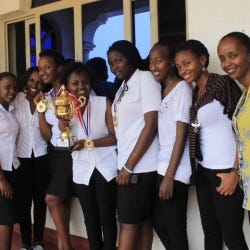Why Female Students Debate Contests Are Important

Akilah Institute for Women (Akilah), will host the very first National Inter-University Women Debate organized by Aspire Debate on Friday, October 30, 2015. The competition will only include young women from various public and private universities across Rwanda. The final competition will be the grand finale following the exciting regional inter-university debates, which occurred in the five provinces of Rwanda on October 23, 2015. Aspire Debate, a group of vibrant young professionals, has been working in collaboration with Akilah to organise the event with the sponsorship and support from the British High Commission.
It is interesting to see that Akilah, the only Women Institute in Rwanda, is hosting the first ‘All Women’ debate at the national level. The Institute has been at the forefront of women empowerment through education since 2010, and debate is one of its highly cherished co-curricular activities. Developing critical thinking and analytical skills among young women is part of Akilah’s focus because such skills enable women to articulate issues that affect them.
David Ntambiye, the Aspire Debate National Coordinator, explained that they have decided to promote debate among young women after realising that male students dominated the previous competitions. “We had very few ladies participating in debates previously and some of those who participated were not confident enough to take on their male counterparts,” Ntambiye said. This prompted the group to consider developing debating skills among young women in universities with the objective of having more women take part in debate activities.
Akilah Institute for Women won the previous National Inter-University debate, which took place in June. The exciting competition involved both male and female participants. Those who attended the event still remember how explosive it was when the female debaters took on their male opponents with poise and confidence. Their victory symbolised the potential that all women have in analysing and critically articulating issues that affect the society. It is no longer prudent for men to act as the voices for women since the latter are capable of speaking out on their own.
We should appreciate the efforts of the organisers, sponsors and promoters of debates among women because they create space for many of them to emerge on the scene which used to be dominated by men. The gap between the two groups is continuously narrowing down. As a feminist, I envisage a situation where there will be relatively equal representation of both men and women in all the affairs of the world. However, this can only be achieved by creating more programmes that promote women emancipation. The young women who are involved in debates today have the ability to lobby for better gender policies which can bring about sustainable development in our society.
Stella Wayianzuvuko, an English language instructor and one of the coordinators of the debate club at Akilah, believes that the event will help women to showcase their skills in public speaking. “I am excited about it because this debate competition is going to open doors for many young women at the university level to voice their opinions. It will help them to get out of their shells, and who knows? We might get great future public speakers among them!” Wayianzuvuko said.
Lisa Doherty, the academic director of Akilah institute, argues that one of the things that inspire women is seeing themselves in positions of power and leadership. “I believe that this debate is so important for our Rwandan female students to see an entire competition full of strong, intelligent, articulate and fearless female debaters from the country,” Lisa said.
Aspire Debate has managed to establish a network of debaters from universities across the country by working closely with the students’ leadership committee to enhance public speaking skills among students. What started as a university debate club in 2013, is now a vibrant organisation capable of organising national debate events. Ntambiye points out that through teamwork, they have been able to challenge their limits. He is proud of his team whose patron is Jennifer Batamuliza, a lecturer for English at the University of Rwanda. The organisation has also formed partnerships with the Rwanda Governance Board, National Youth Council and the Pan African Movement.
We should inspire more young women to love debate.
Paul Swaga is an English Language Instructor at Akilah Institute for Women.
Cross posted from The New Times
Originally published at www.akilahinstitute.org on October 29, 2015.
